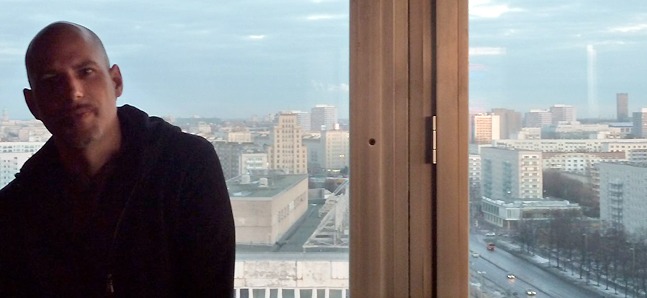
Posted: Mon Apr 26 2010
Ever-popular techno act Daniel Bell is coming to Japan again for a tour this Golden Week. Born in California and after spending time as student in Canada, he was captured by the vibrant music scene in Detroit and made it his adopted home. He began producing electronic music there, and established a distinctive style of minimal techno along with likes of Richie Hawtin, and has released a series of tracks now considered as classics under monikers such as DBX.
In 2000, Bell made the move to Berlin, and caught on as a DJ in the European city. Just a few weeks ago, his official mix CD, ‘Globus Mix Vol. 4 - The Button Down Mind Of Daniel Bell’, originally released in 2000 by Berlin's club/record label Tresor was re-issued. May 1, 2010 sees Bell performing his last live set as DBX (using his current hardware setup) at Club Unit in Tokyo. Time Out Tokyo got a chance to chat with Bell, while in Berlin, about dance music, the German capital, and the last ten years.
Your mix CD from 10 years ago, ‘Globus Mix Vol. 4 - The Button Down Mind Of Daniel Bell’ was re-issued last month. How do you feel about people listening to it now? Do you think it still represents who you are and is still relevant to today's audience?
DB: Yeah. I think so. It's dance music, and by nature it's trendy in a way. Styles change and things come and go. But there are some fundamentals in this music that are timeless. If you stick with those, things don't seem to age that much. Maybe production-wise, but the ideas stay around long. So, I think, with a lot of the records on there fall to that category. In fact, I don't think it's that removed from what's happening now. I think it could come out today and wouln’t be such a shock.
That's exactly how I felt. If I was told, 'This is the latest mix by Daniel Bell,' I think I would have believed it. It really doesn't feel much different from what you hear in clubs today – which is amazing, but at the same time, it could mean that dance music hasn't developed much in the past 10 years.
DB: I would agree with you. I have mixed emotions about that.
Could it mean that you were 10 years ahead of time?
DB: I don't know. I think, ultimately, not much has changed since 2000. I think sometimes that these trends end up trivializing and maybe destruct people. And what happens it that things aren't moving as forward as they were... that's how I feel.
Do you still play at Globus (the second room of the Berlin's techno club Tresor) now?
DB: I think it's a couple of times a year now. It's always like this in Berlin... there are several clubs, so I kind of try to play at one every few months or so. I don't play in one club consistently anymore.
But 10 years ago, it was the main club you played in Berlin.
DB: Yeah, that's right. I don't even remember playing anywhere else around that time. It was always Tresor. Tresor had this special connection to Detroit, so through that, I was one of the many guys who were a resident or semi-resident of the club.
How do you see Tresor now?
DB: It's kind of an established thing that so much grew from it. It's such a starting point. Such a historical place for what we did. And this whole connection to Germany really came through Tresor for a lot of people, for a lot of artists in Detroit. That's how I view it. It's a catalyst for something that grew so big now.
You also moved to Berlin in the year 2000.
DB: I came here [Berlin] in 2000. How it originally worked was that I came to Berlin to do DJ gigs to support this mix CD. And the plan was to rent a place here just because I thought it would be cool to come and hang out here for 3 month. Did this tour through Tresor, and – at the end of the 3 months I said, 'Why don't I just stay? I don't see the point in going back.’ [Laughs]
I just really felt connected to what was happening here. In a way, it was kind of what I felt was being lost being in Detroit. There were still many producers there doing great music, but the actual club scene just kept going down and down. Here, I felt like there's a huge amount of things happening and lots of people were really dedicating club goers who really knew music. So it was like, 'Wow, this is great!' So I just decided to stay. And I'm glad that I came then because I was one of the first American DJs to come and take residence here. It was nice because the majority of the people I was hanging out with and friends were all Germans. That was nice, you know. In comparison, now, with so many foreigners coming here they have this kind of own little sect or a little group – but coming earlier not having other American producers to talk to, or to hang out with, that forced me to broaden my horizons.
Berlin has grown into the techno capital of the world. Does that make you feel happy? Or do you feel like there are things that have been lost along the way? Do you still feel comfortable being here?
DB: Yeah. Just as you said, it's definitely the centre of all this music now and I don't think anyone is disputing that. It's such a major force worldwide for this music. Whatever the trends are that evolve from here spread out. So it's kind of a ground zero. And that's been like that for a little while now. It's a little bittersweet because I remember when there were American cities [such as New York City, Chicago and Detroit] that were the trend centres, you know. Now I'm on the other side of the world, so it's a little bit odd, but it's nice to be in this atmosphere.
It's really cool how people who've been here who built all this have been very accommodating to people who come here later – still surprised me considering the amount of foreigners coming to Berlin. I think that's the strength, you know. That it's really assimilating all this. And I don't think it's lost its edge at all. Of course, the clubs got bigger and they change when they get bigger, but there are still so many smaller clubs that support something more underground. I don't think it's lost its way. I'm still always amazed by the amount of things happening here on any given weekend. It's incredible.
Daniel Bell live at Cabaret
Genre: house, techno
DJ: Daniel Bell (7th City/Elevate), Yone-ko (Runch/Mussen Project Records), Masda (Toboggan), Sackrai (Op.disc/Nrk/Minimood/Archipel)
Date: Sat May 1
Time: 11.30pm open/start
Location: Unit (Full details & map)
Admission: ¥3,500; ¥3,000 adv or with flyer
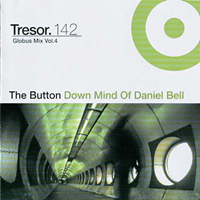
‘Globus Mix Vol. 4 - The Button Down Mind Of Daniel Bell’
Released: May 2000, Tresor
Tweets
- About Us |
- Work for Time Out |
- Send us info |
- Advertising |
- Mobile edition |
- Terms & Conditions |
- Privacy policy |
- Contact Us
Copyright © 2014 Time Out Tokyo










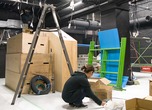
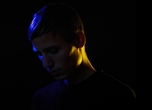
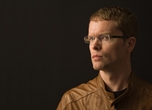
Add your comment